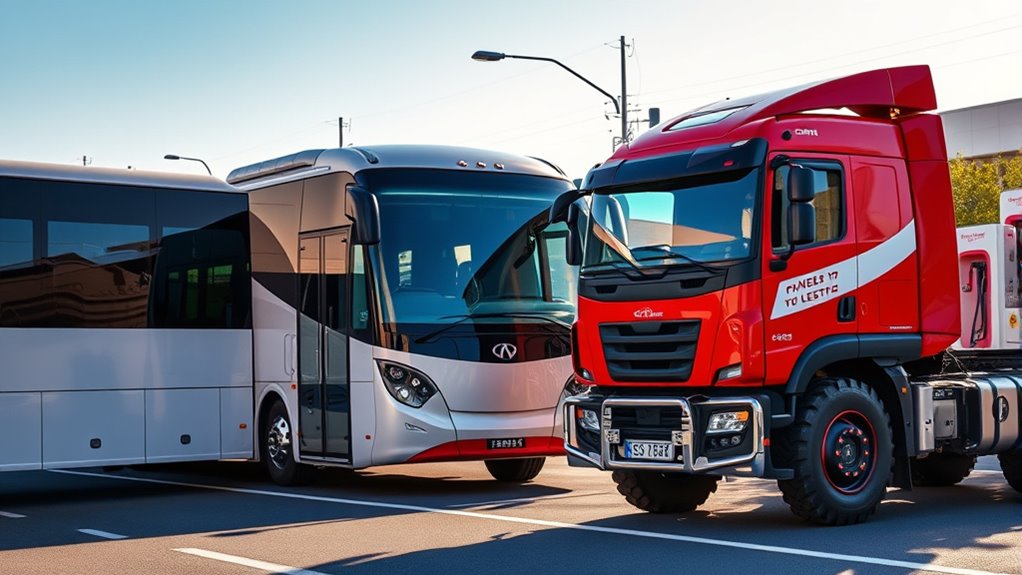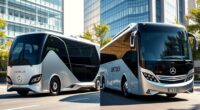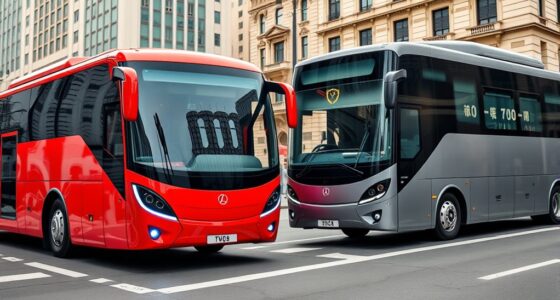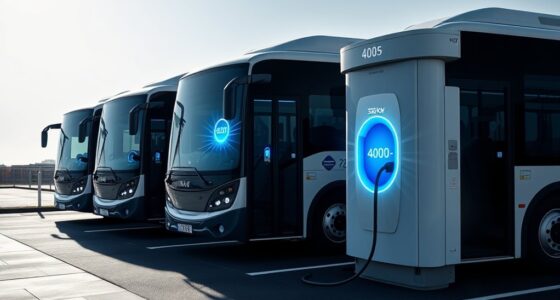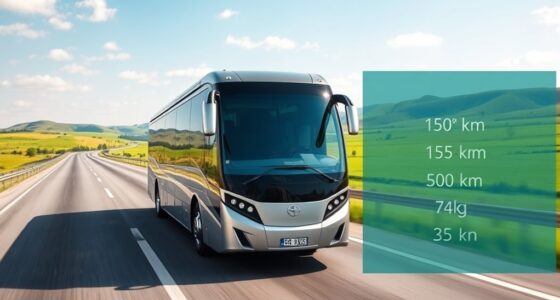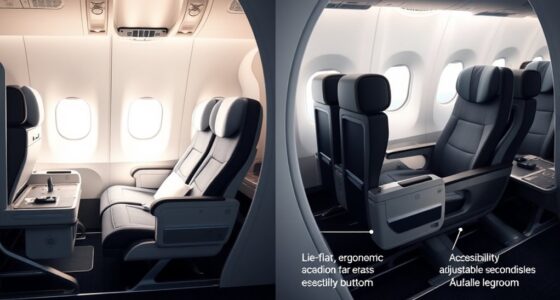Electric coaches and trucks both shift transportation away from fossil fuels, but they transfer different needs and face distinct challenges. Coaches focus on passenger routes and require extensive, fast-charging infrastructure along transit lines, while trucks deliver cargo over longer distances and need high-capacity chargers at depots. Technologies like batteries and fast chargers are evolving differently for each, and understanding these changes can give you a clearer picture of their future. Keep exploring to discover how these differences shape their progress.
Key Takeaways
- Electric coaches and trucks differ mainly in their operational environments and infrastructure requirements.
- Coaches need extensive route-based charging networks, while trucks require high-capacity chargers at depots.
- Battery technology advancements improve range, charging speed, and durability for both vehicle types.
- Electric trucks demand higher power chargers to support longer routes and heavier loads.
- Future transfers involve integrating high-capacity charging stations and advanced batteries for widespread adoption.

Have you ever wondered how electric coaches compare to electric trucks? Both are transforming transportation, but they serve different purposes and face unique challenges. One of the biggest differences lies in their charging infrastructure needs. Electric coaches, used mainly for public transit or long-distance travel, require extensive charging networks along routes to keep them on schedule. These buses often need fast chargers at terminals or designated stops, making the deployment of charging stations more complex but indispensable for maintaining operational efficiency. Electric trucks, on the other hand, are primarily used for freight and logistics, which means their charging infrastructure must support higher power demands for longer routes and heavier loads. Fleets may need larger, faster chargers at distribution centers or depots, and as charging technology advances, these setups are becoming more feasible and widespread. The development of high-capacity charging stations is essential for enabling electric trucks to match the range and productivity of traditional diesel-powered counterparts. Additionally, evolving battery technology is crucial for both vehicle types, improving range, charging times, and durability to support their operational needs.
Frequently Asked Questions
How Do Charging Times Compare Between Electric Coaches and Trucks?
Charging times for electric coaches are generally longer than for trucks, mainly because coaches have larger batteries and require more charging infrastructure. While trucks can often be charged quickly at fast-charging stations, coaches may need more time to recharge fully, impacting scheduling. Battery longevity is essential; frequent rapid charging can affect it over time. So, you should consider charging options and infrastructure availability to optimize both charging times and battery health.
What Are the Maintenance Differences for Electric Coaches Versus Electric Trucks?
Think of maintaining electric coaches and trucks like tending to two different gardens. Electric coaches typically require less maintenance on parts like brakes and transmissions but need regular checks on batteries and HVAC systems. Electric trucks, with heavier loads, may wear brakes faster and need more frequent tire inspections. For fleet management, guarantee drivers are trained properly to handle these differences, minimizing downtime and keeping everything running smoothly.
Which Is More Cost-Effective Over the Vehicle’s Lifespan?
Electric trucks tend to be more cost-effective over their lifespan because they usually have a lower total cost, thanks to cheaper maintenance and operation costs. While the initial investment for electric coaches can be higher due to their size and features, the long-term savings on fuel and upkeep make electric trucks a smarter choice financially. You’ll see better value and return on investment with electric trucks over time.
How Do Route Planning Considerations Differ for Electric Coaches and Trucks?
You need to consider passenger comfort and route flexibility when planning routes for electric coaches and trucks. For coaches, prioritize smooth, comfortable journeys, avoiding rough roads and tight turns that affect passenger experience. Trucks require more flexible routes to accommodate deliveries and cargo loads, often needing charging stations along their paths. Both need careful planning to optimize efficiency, but coach routes focus more on passenger comfort, while trucks emphasize route adaptability.
What Regulatory Challenges Are Unique to Each Vehicle Type?
You face unique regulatory challenges for each vehicle type. Electric coaches must meet strict safety standards for passenger transport and obtain specific licensing requirements, often involving passenger safety and comfort regulations. Electric trucks, on the other hand, focus on freight safety and roadworthiness, requiring specialized licenses for commercial use. Managing these differing safety and licensing regulations demands careful planning to ensure compliance and smooth operation for both vehicle types.
Conclusion
In the end, whether you’re choosing an electric coach or truck, it’s clear that both are shaping the future of transportation. Each has its strengths and challenges, but neither is a one-trick pony. Keep in mind, you can’t have your cake and eat it too, so weigh your options carefully. Embracing these electric options means you’re on the right track toward a cleaner, more sustainable world—just remember, it’s a journey, not a sprint.
